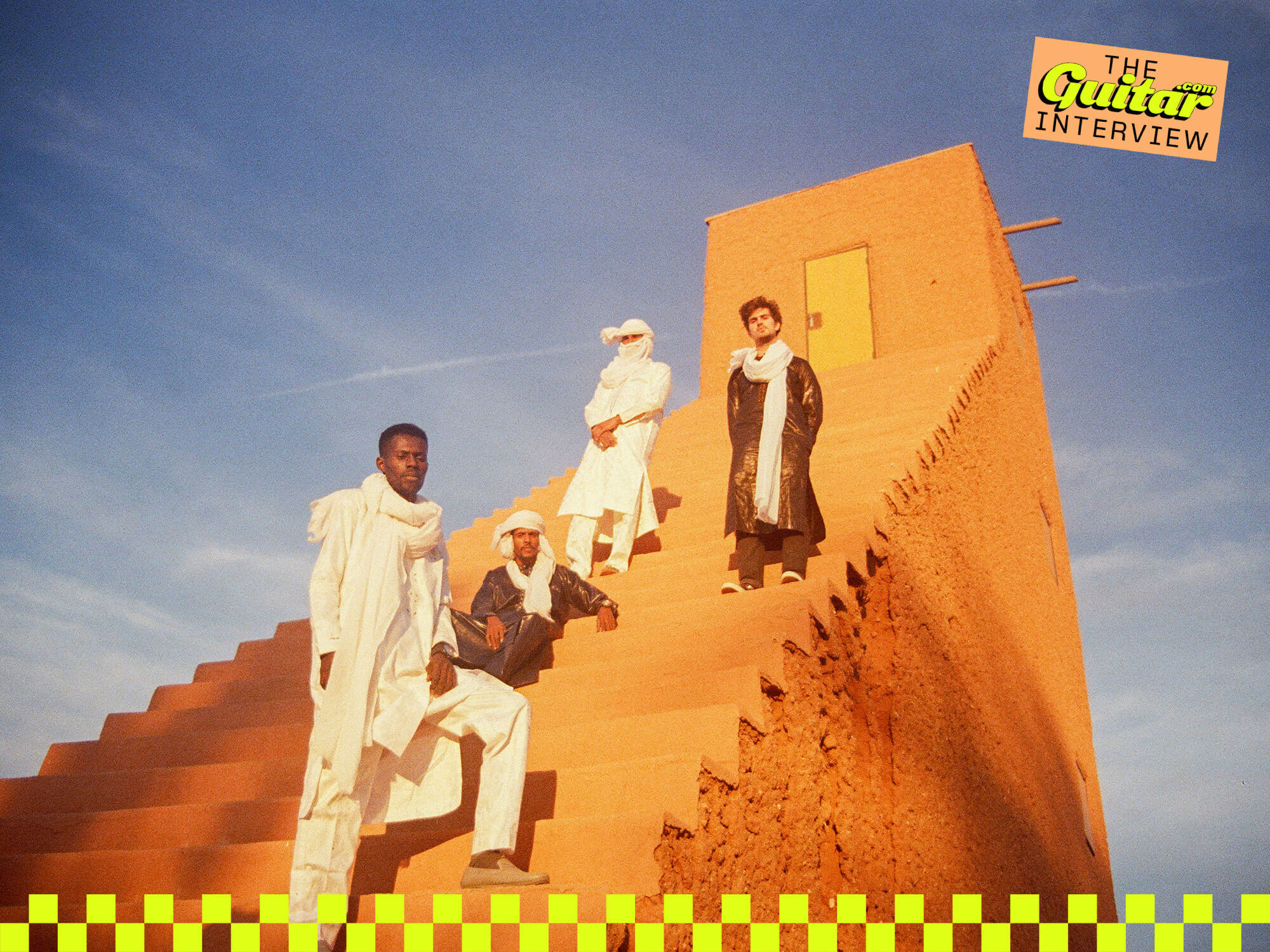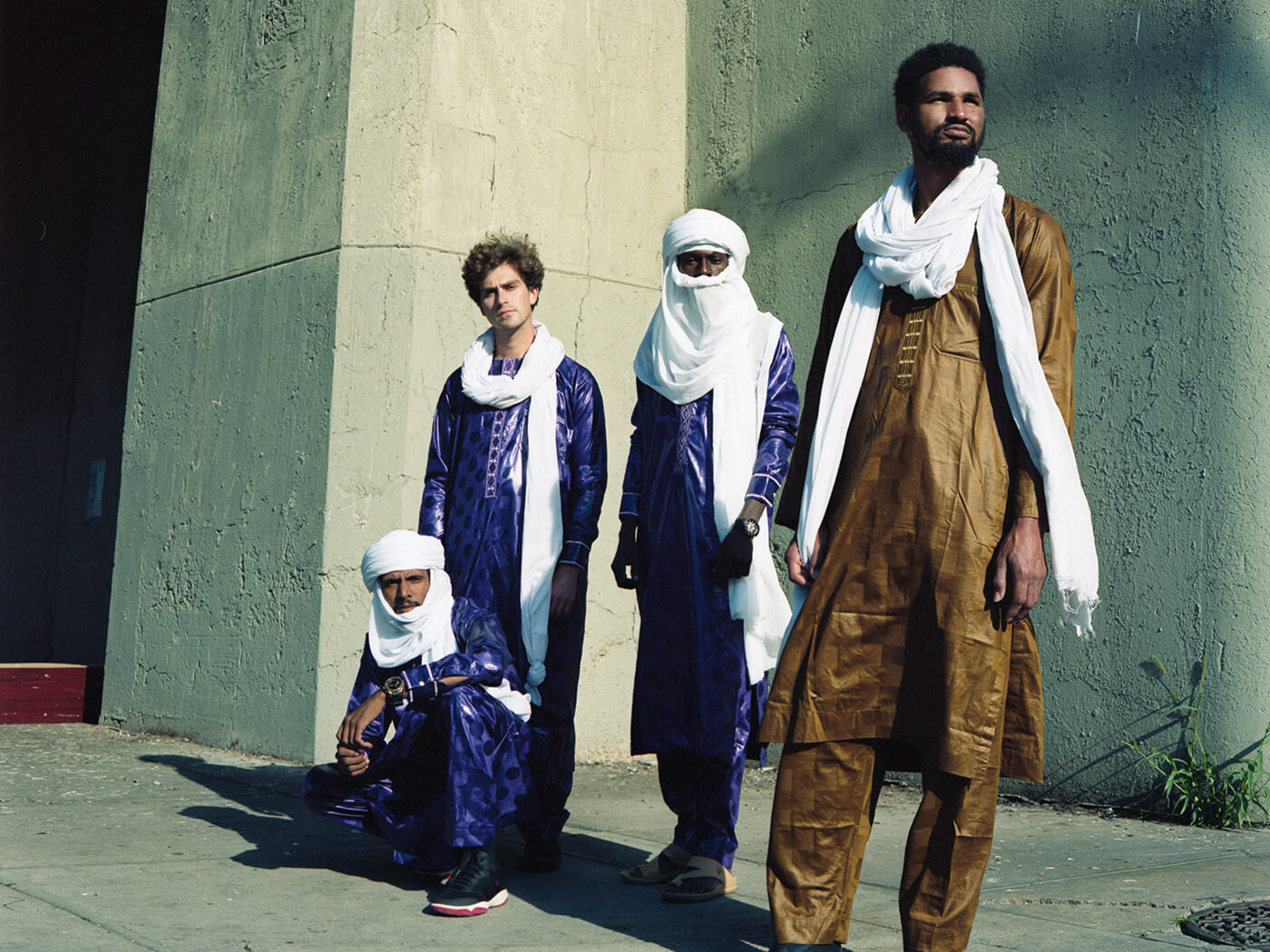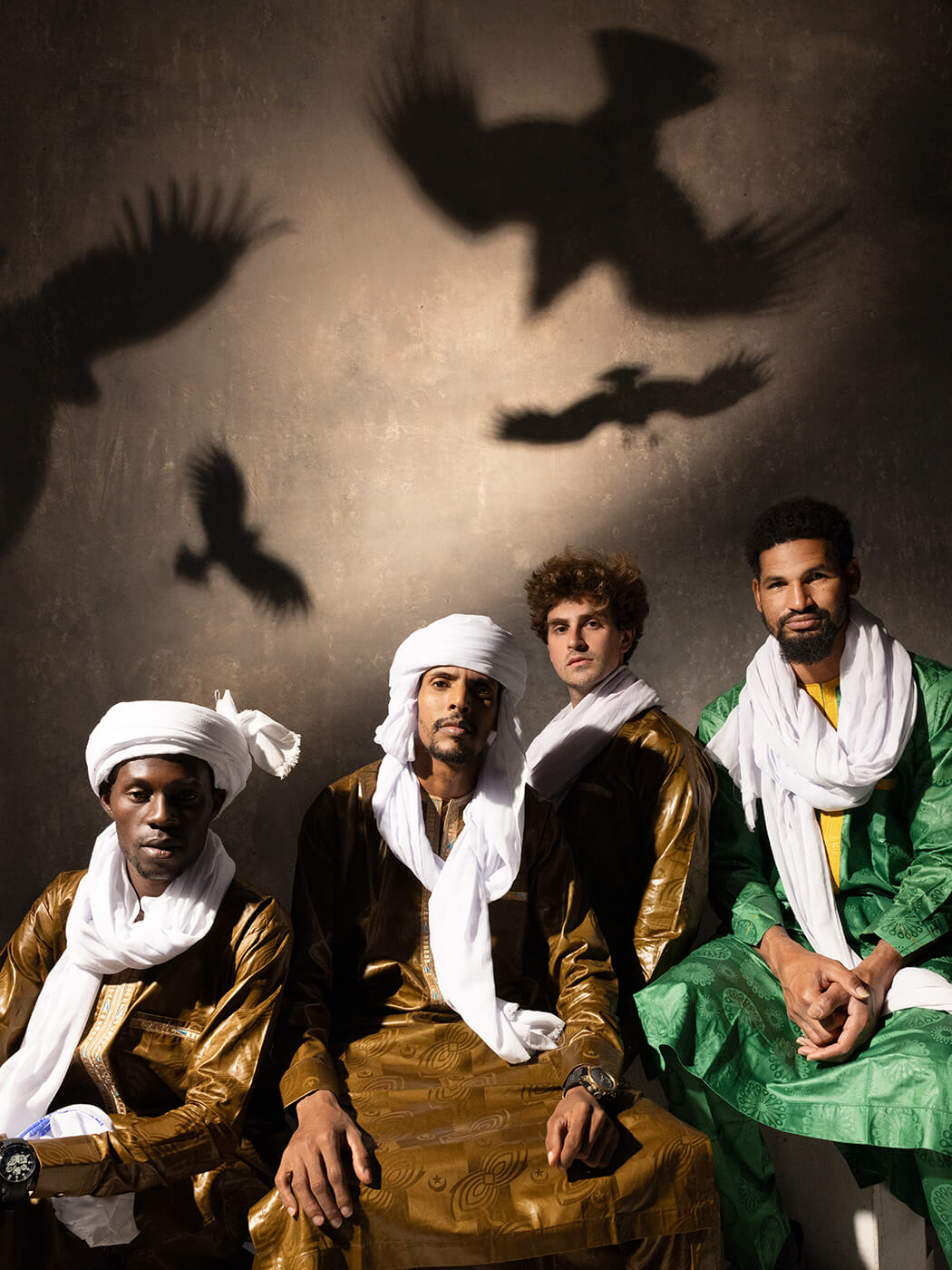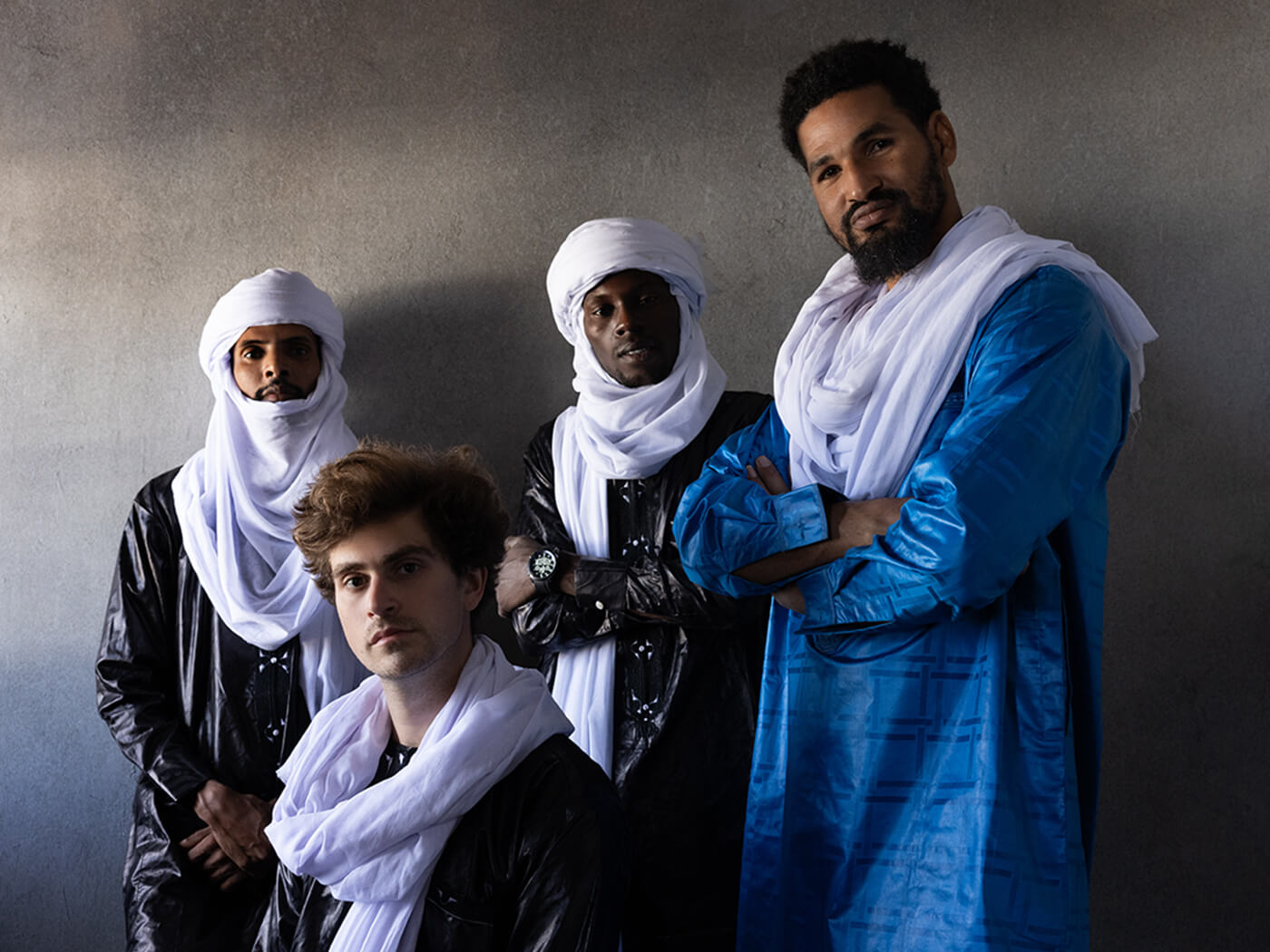Related Tags
Mdou Moctar on channeling righteous fury and creating ‘Funeral For Justice’
The Taureg guitarist and bassist/producer Mikey Coltun on the meticulous preparation that allowed them to create his most free and experimental album yet.

Mdou Moctar. Image: Nelson Antonio Espina
Mdou Moctar wants his latest record to tell you two things: how he feels and how his band sounds live. Funeral For Justice is a seething, writhing thing, with the Nigerien guitarist’s coiled playing always on the brink of something pyrotechnic. The surprising ferocity of its first chords will rock you back on your heels, and from there he doesn’t stop ducking and weaving. “The most important thing was to really be given the space to play what we felt deep down,” Moctar says through a translator.
Following the release of Afrique Victime in 2021, Moctar and his bandmates – guitarist Ahmoudou Madassane, bassist Mikey Coltun and drummer Souleymane Ibrahim – hit the road hard. Over time their sound, a mesh of Tuareg guitar music and blown-out kinetic energy, grew wilder and more confrontational in its volume and delivery. That muscularity began to bleed into the embryonic songs they were assembling. “The way we compose musically is based entirely on how we feel and what nature offers us in the moment,” Moctar observes.
“We never do a setlist, so we will pull something out that we had maybe tried at soundcheck, and we will work on it at the show,” Coltun adds. “We had been working on these songs, in one way or another, during the Afrique Victime touring cycle, every night.”

Get Real
As their live power began to grow, Moctar continued to reflect on home from thousands of miles away. He wrote lyrics that bit back at western colonialism, recounting his fears for the dwindling Tamasheq language at one moment before flipping into defiance the next. “Retake control of your resource rich countries,” he sings on the title track. “Build them and quit sleeping.” At every turn, his words are answered by songs that buck and whirl through solos and elongated, groove-heavy jams. “There’s such angst and urgency in the lyrics,” Coltun says. “It needed to match up.”
In the summer of 2023, soon after Funeral For Justice was finished, the political face of Niger was altered following a military coup, with the democratically elected president Mohamed Bazoum ousted and held in his residence in Niamey, the country’s capital. Moctar and his bandmates were subsequently stranded in the US, having to launch a GoFundMe to support themselves and their families.
The chaotic record they’d made, though, inadvertently held a mirror up to this fluctuating reality, with the angst and urgency that Coltun describes answering back to the confusion and dislocation sparked by this postscript. With its shuffling percussive gait and barbed riffs, they are always on the move. Even in moments when they hew closer to the classic rock canon than ever before, there is a sense of uncovering something unexpected. “When we composed the album, it was just like a concert,” Moctar adds. “The only difference, of course, was that we were missing an audience. So we focused on each other to get that energy.”

Pushing Hard
Coltun, who again served as producer on Funeral For Justice, took that attitude into recording, pushing hard to deliver as accurate a representation of the band’s live sound as he could. He has long been of the opinion that Moctar’s first experiences playing live at sprawling weddings in the Nigerien city of Agadez – with amps, PAs and generators strewn amid the crowd – ran in parallel to his own education in Washington, DC’s DIY punk scene.
“I didn’t want to stylise it anymore,” he says. “I wanted to capture what this band is, and this band is a loud rock band and it is a fast punk band and it is all these things. It was very natural. Mdou has spoken about this — we’re not changing anything within Tuareg music. It’s just bringing these things out.”
Where Afrique Victime was chiefly tracked on the road, in hotel rooms, apartments or backstage recesses, this time around the band headed to upstate New York and an essentially empty house for five days of recording. “Mikey always understands what we need, and he was able to set that up and make it happen,” Moctar says.
“We really just wanted the freedom to play at any time and to have a space,” Coltun continues. “I brought an assistant engineer with me, I DI’d all the guitars and bass so I could re-amp them later. I like spending a lot of time with mic-ing amps and trying different things but I knew that wasn’t the process here. We just needed to get it — to get the songs and the energy. It was about capturing the drums and the vocals. We would do scratch vocals then Mdou and I, in the mornings, would redo them.”

Finding A Way
Once they were settled in their sparse surroundings Coltun discovered problems that would need to be solved with the same ingenuity that allowed Moctar to play his early shows with broken amplifiers (not to mention famously building his first guitar using wire from bike brake cables and pegs from sardine cans). “I had planned this with my assistant months out,” Coltun recalls. “He came on tour with us as our backline tech. We were talking about it a lot. I had all this gear that I could borrow, he had some gear, so we just put it together.”
“We mapped it out. We did all the inputting ahead of time, but we basically had to set up a studio because there was nothing there. We forgot cables, you know? There was a DB25 coupler that we didn’t have, and we’re two hours away from the closest Guitar Center. We were figuring out how to make it work, which is kind of the nature of Mdou Moctar. Things don’t really go as planned all the time but the project is [founded upon] being resilient.”
Moctar turned to his trademark left-handed white USA Strat during recording, with Madassane playing his beloved 1980s Squier. “Ahmoudou leaves that in New York because he says everyone wants to play it in Niger,” Coltun says with a laugh, also noting that he personally leaned on a ‘66 Mustang bass. “I wanted it to just go in as clean as possible,” he says. “And then later on I added an Analog Man fuzz or a Union Tube & Transistor fuzz.”
In the mix throughout on Moctar’s board – alongside an Earthquaker Devices Acapulco Gold, a Union Tube & Transistor Shiny, a Boss PH-3 and a digital delay – was his signature Rocktar fuzz, a boutique piece of kit developed alongside Philly-based pedal makers Champion Leccy. “Mdou uses that as his clean boost,” Coltun says. “It’s kind of always on.”
Play It Again
Interestingly, while this is a record defined by its live-in-the-room veracity it’s also the first Mdou Moctar release Coltun has made where multiple takes were permitted. Chiefly, that was so they could wander around a bit before reaching their destination. They essentially used the studio to emphasise the open-ended nature of their playing, fusing what amounted to a couple of nights’ worth of improv into a single session. “We did two two takes, three max, and then I took it and chopped them up,” Coltun says. “They were more like jams, but the songs were there.”
“There are so many versions of the songs,” he continues. “And sometimes I’m like, ‘Oh, man, we should have captured that, let’s go back in the studio and do it.’ But, no, that’s the beauty of it. We can play them acoustically. We can play them electric. Maybe the feel is different, or maybe it’s in a different key, so that helps inform a different way of soloing. They’re just cells to build off. You’re getting a taste of it on the record, but live you’re gonna hear something completely different.”
At the heart of that shape-shifting is the chemistry that has developed between Moctar, Madassane and Coltun. On Imouhar or Sousoume Tamacheq, for example, their relationship is essentially symbiotic. Moctar trades in flurries of notes, peeling off acrobatic runs one moment before digging in hard the next, and when he leaves a pocket of space Madassane pours into it with ragged chords. Coltun nips at their heels, driving the pace with Ibrahim. It can be a dizzying thing to follow, but that’s fundamental to understanding the joy behind each synapse-firing twist.
“Ahmoudou and Mikey are extremely important,” Moctar says. “They both know their instruments and their roles very well, and each contributes in the right way at the right time, but in a very spontaneous way. That’s what I really enjoy. We don’t really need to practise in the sense of coordinating who’s doing what and when. We can just play.”
Mdou Moctar’s ‘Funeral For Justice’ is out on May 3 through Matador
